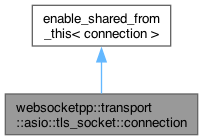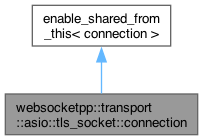TLS enabled Asio connection socket component.
More...
#include <tls.hpp>
|
| typedef connection | type |
| | Type of this connection socket component.
|
| |
| typedef lib::shared_ptr< type > | ptr |
| | Type of a shared pointer to this connection socket component.
|
| |
| typedef lib::asio::ssl::stream< lib::asio::ip::tcp::socket > | socket_type |
| | Type of the ASIO socket being used.
|
| |
| typedef lib::shared_ptr< socket_type > | socket_ptr |
| | Type of a shared pointer to the ASIO socket being used.
|
| |
| typedef lib::asio::io_service * | io_service_ptr |
| | Type of a pointer to the ASIO io_service being used.
|
| |
| typedef lib::shared_ptr< lib::asio::io_service::strand > | strand_ptr |
| | Type of a pointer to the ASIO io_service strand being used.
|
| |
| typedef lib::shared_ptr< lib::asio::ssl::context > | context_ptr |
| | Type of a shared pointer to the ASIO TLS context being used.
|
| |
transport::asio::tls_socket::connection implements a secure connection socket component that uses Asio's ssl::stream to wrap an ip::tcp::socket.
Definition at line 63 of file tls.hpp.
◆ context_ptr
◆ io_service_ptr
◆ ptr
◆ socket_ptr
◆ socket_type
◆ strand_ptr
◆ type
◆ connection()
| websocketpp::transport::asio::tls_socket::connection::connection |
( |
| ) |
|
|
inlineexplicit |
◆ async_shutdown()
Definition at line 327 of file tls.hpp.
327 {
328 if (m_strand) {
329 m_socket->async_shutdown(m_strand->wrap(callback));
330 } else {
331 m_socket->async_shutdown(callback);
332 }
333 }
◆ cancel_socket()
| lib::asio::error_code websocketpp::transport::asio::tls_socket::connection::cancel_socket |
( |
| ) |
|
|
inlineprotected |
Attempts to cancel all async operations on this socket and reports any failures.
NOTE: Windows XP and earlier do not support socket cancellation.
- Returns
- The error that occurred, if any.
Definition at line 321 of file tls.hpp.
321 {
322 lib::asio::error_code ec;
324 return ec;
325 }
socket_type::lowest_layer_type & get_raw_socket()
Retrieve a pointer to the underlying socket.
◆ get_ec()
| lib::error_code websocketpp::transport::asio::tls_socket::connection::get_ec |
( |
| ) |
const |
|
inlineprotected |
Definition at line 308 of file tls.hpp.
308 {
309 return m_ec;
310 }
◆ get_next_layer()
| socket_type::next_layer_type & websocketpp::transport::asio::tls_socket::connection::get_next_layer |
( |
| ) |
|
|
inline |
This is used internally.
Definition at line 111 of file tls.hpp.
111 {
112 return m_socket->next_layer();
113 }
◆ get_raw_socket()
| socket_type::lowest_layer_type & websocketpp::transport::asio::tls_socket::connection::get_raw_socket |
( |
| ) |
|
|
inline |
This is used internally. It can also be used to set socket options, etc
Definition at line 103 of file tls.hpp.
103 {
104 return m_socket->lowest_layer();
105 }
◆ get_remote_endpoint()
| std::string websocketpp::transport::asio::tls_socket::connection::get_remote_endpoint |
( |
lib::error_code & | ec | ) |
const |
|
inline |
The iostream transport has no information about the ultimate remote endpoint. It will return the string "iostream transport". To indicate this.
TODO: allow user settable remote endpoint addresses if this seems useful
- Returns
- A string identifying the address of the remote endpoint
Definition at line 158 of file tls.hpp.
158 {
160
161 lib::asio::error_code aec;
162 lib::asio::ip::tcp::endpoint ep = m_socket->lowest_layer().remote_endpoint(aec);
163
164 if (aec) {
166 s <<
"Error getting remote endpoint: " << aec
167 << " (" << aec.message() << ")";
169 } else {
170 ec = lib::error_code();
173 }
174 }
lib::error_code make_error_code(error::value e)
Create an error code with the given value and the asio transport category.
@ pass_through
there was an error in the underlying transport library
◆ get_shared()
| ptr websocketpp::transport::asio::tls_socket::connection::get_shared |
( |
| ) |
|
|
inline |
Definition at line 87 of file tls.hpp.
87 {
88 return shared_from_this();
89 }
◆ get_socket()
| socket_type & websocketpp::transport::asio::tls_socket::connection::get_socket |
( |
| ) |
|
|
inline |
This is used internally.
Definition at line 119 of file tls.hpp.
119 {
120 return *m_socket;
121 }
◆ handle_init()
| void websocketpp::transport::asio::tls_socket::connection::handle_init |
( |
init_handler | callback, |
|
|
lib::asio::error_code const & | ec ) |
|
inlineprotected |
Definition at line 298 of file tls.hpp.
298 {
299 if (ec) {
301 } else {
302 m_ec = lib::error_code();
303 }
304
305 callback(m_ec);
306 }
@ tls_handshake_failed
TLS Handshake Failed.
lib::error_code make_error_code(error::value e)
◆ init_asio()
| lib::error_code websocketpp::transport::asio::tls_socket::connection::init_asio |
( |
io_service_ptr | service, |
|
|
strand_ptr | strand, |
|
|
bool | is_server ) |
|
inlineprotected |
init_asio is called once immediately after construction to initialize Asio components to the io_service
- Parameters
-
| service | A pointer to the endpoint's io_service |
| strand | A pointer to the connection's strand |
| is_server | Whether or not the endpoint is a server or not. |
Definition at line 185 of file tls.hpp.
187 {
188 if (!m_tls_init_handler) {
190 }
191 m_context = m_tls_init_handler(m_hdl);
192
193 if (!m_context) {
195 }
196 m_socket = lib::make_shared<socket_type>(*service, *m_context);
197
198 m_io_service = service;
199 m_strand = strand;
200 m_is_server = is_server;
201
202 return lib::error_code();
203 }
@ missing_tls_init_handler
Required tls_init handler not present.
◆ is_secure()
| bool websocketpp::transport::asio::tls_socket::connection::is_secure |
( |
| ) |
const |
|
inline |
- Returns
- Whether or not this connection is secure
Definition at line 95 of file tls.hpp.
95 {
96 return true;
97 }
◆ post_init()
| void websocketpp::transport::asio::tls_socket::connection::post_init |
( |
init_handler | callback | ) |
|
|
inlineprotected |
Called by the transport after all intermediate proxies have been negotiated. This gives the security policy the chance to talk with the real remote endpoint for a bit before the websocket handshake.
- Parameters
-
| callback | Handler to call back with completion information |
Definition at line 262 of file tls.hpp.
262 {
264
265
266 if (m_strand) {
267 m_socket->async_handshake(
268 get_handshake_type(),
269 m_strand->wrap(lib::bind(
271 callback,
272 lib::placeholders::_1
273 ))
274 );
275 } else {
276 m_socket->async_handshake(
277 get_handshake_type(),
278 lib::bind(
280 callback,
281 lib::placeholders::_1
282 )
283 );
284 }
285 }
void handle_init(init_handler callback, lib::asio::error_code const &ec)
ptr get_shared()
Get a shared pointer to this component.
@ tls_handshake_timeout
TLS Handshake Timeout.
◆ pre_init()
| void websocketpp::transport::asio::tls_socket::connection::pre_init |
( |
init_handler | callback | ) |
|
|
inlineprotected |
Called by the transport after a new connection is created to initialize the socket component of the connection. This method is not allowed to write any bytes to the wire. This initialization happens before any proxies or other intermediate wrappers are negotiated.
- Parameters
-
| callback | Handler to call back with completion information |
Definition at line 230 of file tls.hpp.
230 {
231
232
233
234#if OPENSSL_VERSION_NUMBER >= 0x90812f
235 if (!m_is_server) {
236
237
238
239 long res = SSL_set_tlsext_host_name(
240 get_socket().native_handle(), m_uri->get_host().c_str());
241 if (!(1 == res)) {
243 }
244 }
245#endif
246
247 if (m_socket_init_handler) {
249 }
250
251 callback(lib::error_code());
252 }
socket_type & get_socket()
Retrieve a pointer to the wrapped socket.
@ tls_failed_sni_hostname
Failed to set TLS SNI hostname.
◆ set_handle()
| void websocketpp::transport::asio::tls_socket::connection::set_handle |
( |
connection_hdl | hdl | ) |
|
|
inlineprotected |
The connection handle is passed to any handlers to identify the connection
- Parameters
-
Definition at line 294 of file tls.hpp.
294 {
295 m_hdl = hdl;
296 }
◆ set_socket_init_handler()
| void websocketpp::transport::asio::tls_socket::connection::set_socket_init_handler |
( |
socket_init_handler | h | ) |
|
|
inline |
The socket initialization handler is called after the socket object is created but before it is used. This gives the application a chance to set any ASIO socket options it needs.
- Parameters
-
| h | The new socket_init_handler |
Definition at line 131 of file tls.hpp.
131 {
132 m_socket_init_handler = h;
133 }
◆ set_tls_init_handler()
| void websocketpp::transport::asio::tls_socket::connection::set_tls_init_handler |
( |
tls_init_handler | h | ) |
|
|
inline |
The tls init handler is called when needed to request a TLS context for the library to use. A TLS init handler must be set and it must return a valid TLS context in order for this endpoint to be able to initialize TLS connections
- Parameters
-
| h | The new tls_init_handler |
Definition at line 144 of file tls.hpp.
144 {
145 m_tls_init_handler = h;
146 }
◆ set_uri()
| void websocketpp::transport::asio::tls_socket::connection::set_uri |
( |
uri_ptr | u | ) |
|
|
inlineprotected |
Called by the transport as a connection is being established to provide the hostname being connected to to the security/socket layer.
This socket policy uses the hostname to set the appropriate TLS SNI header.
- Since
- 0.6.0
- Parameters
-
Definition at line 217 of file tls.hpp.
217 {
218 m_uri = u;
219 }
◆ translate_ec() [1/2]
template<typename ErrorCodeType >
| lib::error_code websocketpp::transport::asio::tls_socket::connection::translate_ec |
( |
ErrorCodeType | ec | ) |
|
|
inlineprotected |
Translate_ec takes an Asio error code and attempts to convert its value to an appropriate websocketpp error code. In the case that the Asio and Websocketpp error types are the same (such as using boost::asio and boost::system_error or using standalone asio and std::system_error the code will be passed through natively.
In the case of a mismatch (boost::asio with std::system_error) a translated code will be returned. Any error that is determined to be related to TLS but does not have a more specific websocketpp error code is returned under the catch all error tls_error. Non-TLS related errors are returned as the transport generic error pass_through
- Since
- 0.3.0
- Parameters
-
| ec | The error code to translate_ec |
- Returns
- The translated error code
Definition at line 355 of file tls.hpp.
355 {
356 if (ec.category() == lib::asio::error::get_ssl_category()) {
357
358
360 } else {
361
362
364 }
365 }
@ pass_through
underlying transport pass through
@ tls_error
Other TLS error.
◆ translate_ec() [2/2]
| lib::error_code websocketpp::transport::asio::tls_socket::connection::translate_ec |
( |
lib::error_code | ec | ) |
|
|
inlineprotected |
Overload of translate_ec to catch cases where lib::error_code is the same type as lib::asio::error_code
Definition at line 369 of file tls.hpp.
369 {
370
371
372
373
374
375
376
377
378 return ec;
379 }
The documentation for this class was generated from the following file:
- libraries/fc/vendor/websocketpp/websocketpp/transport/asio/security/tls.hpp











